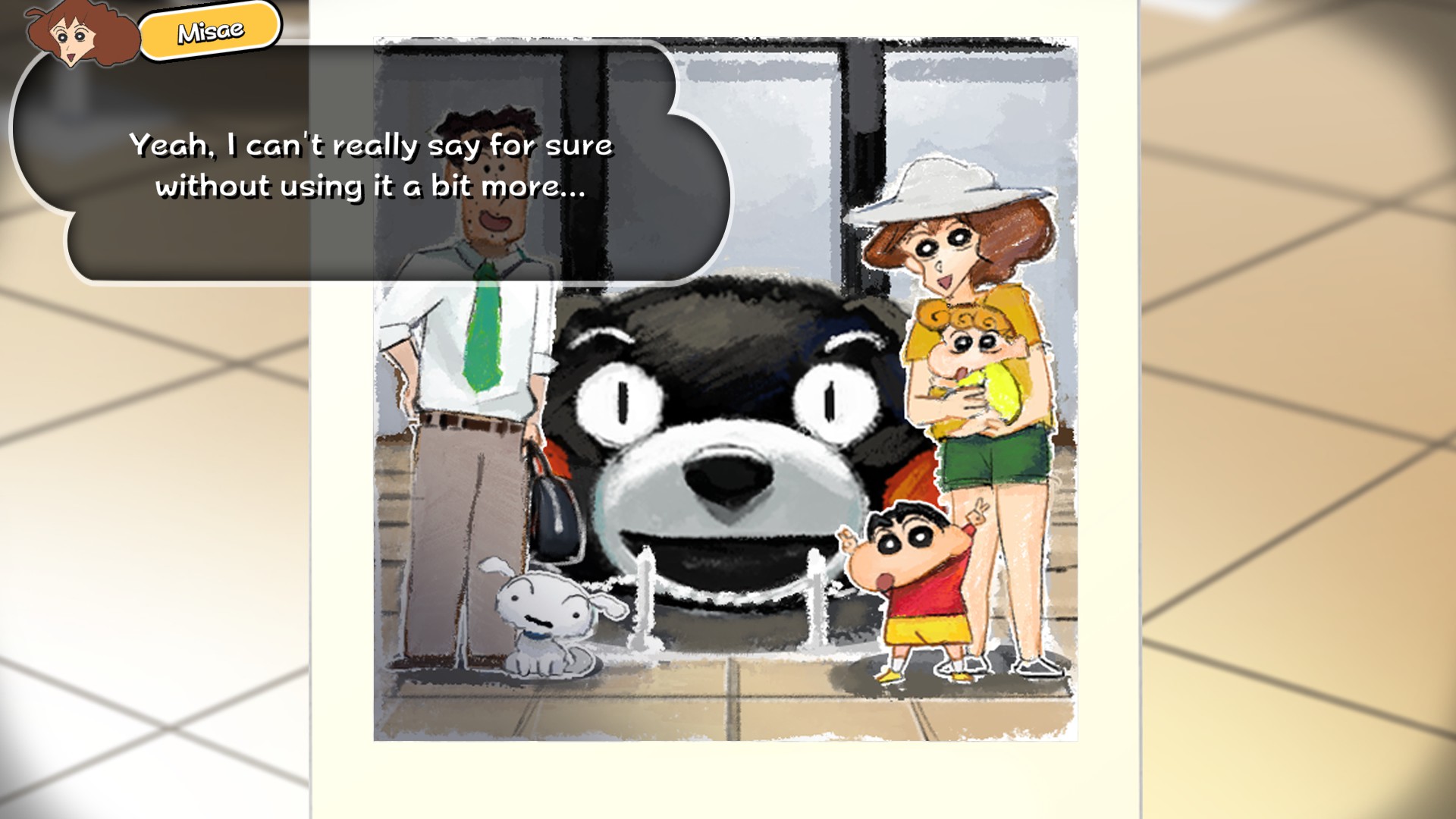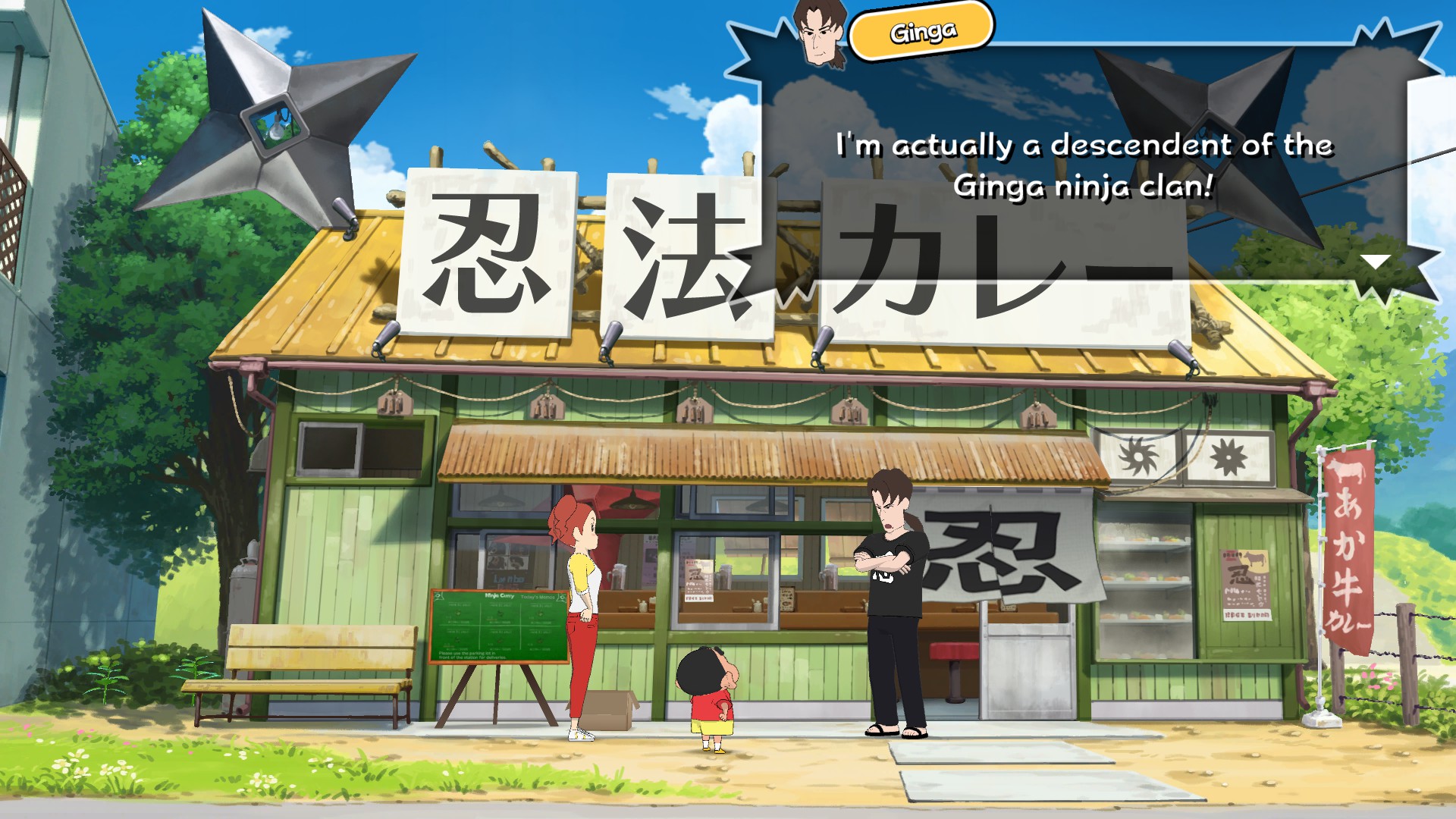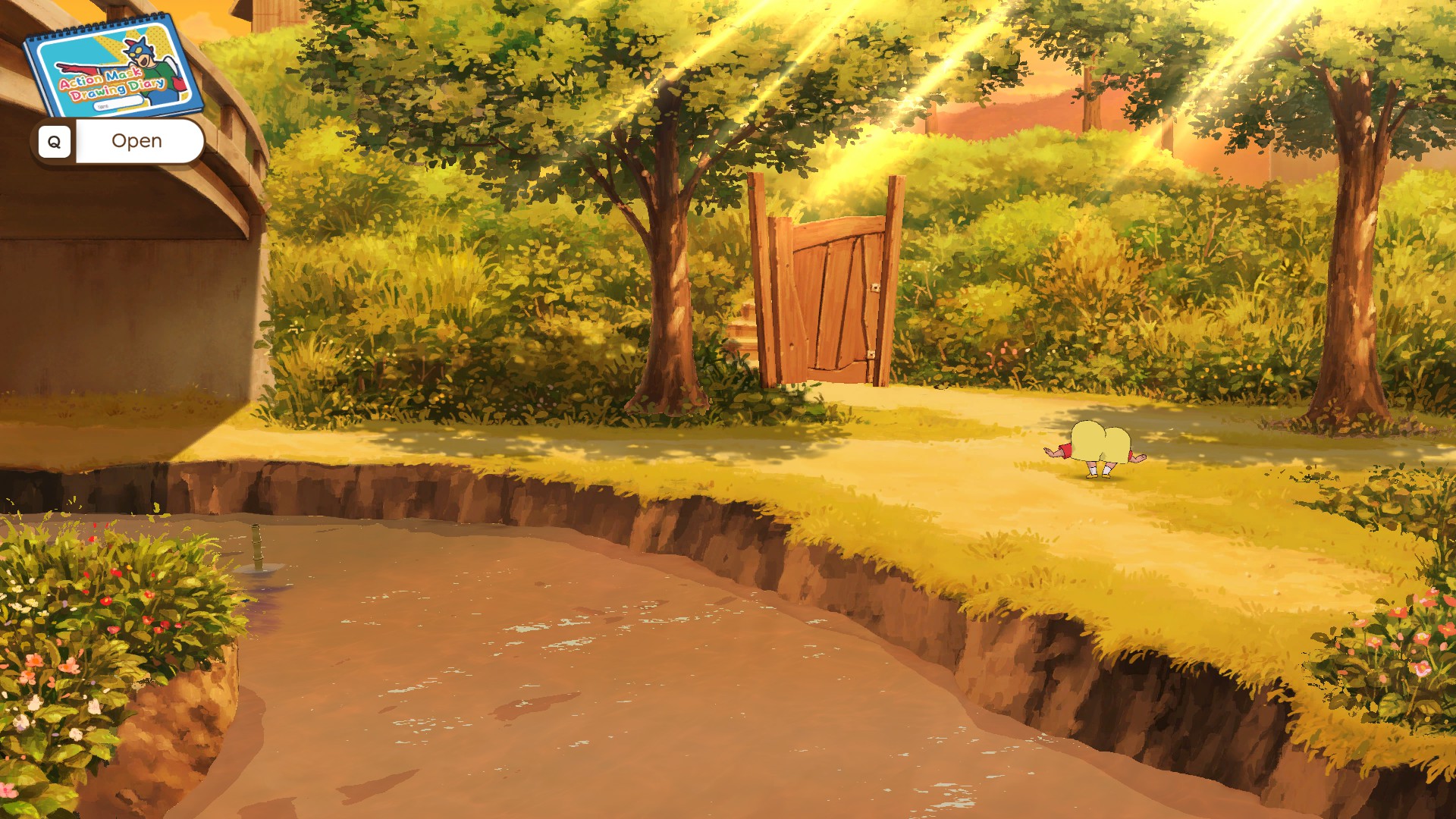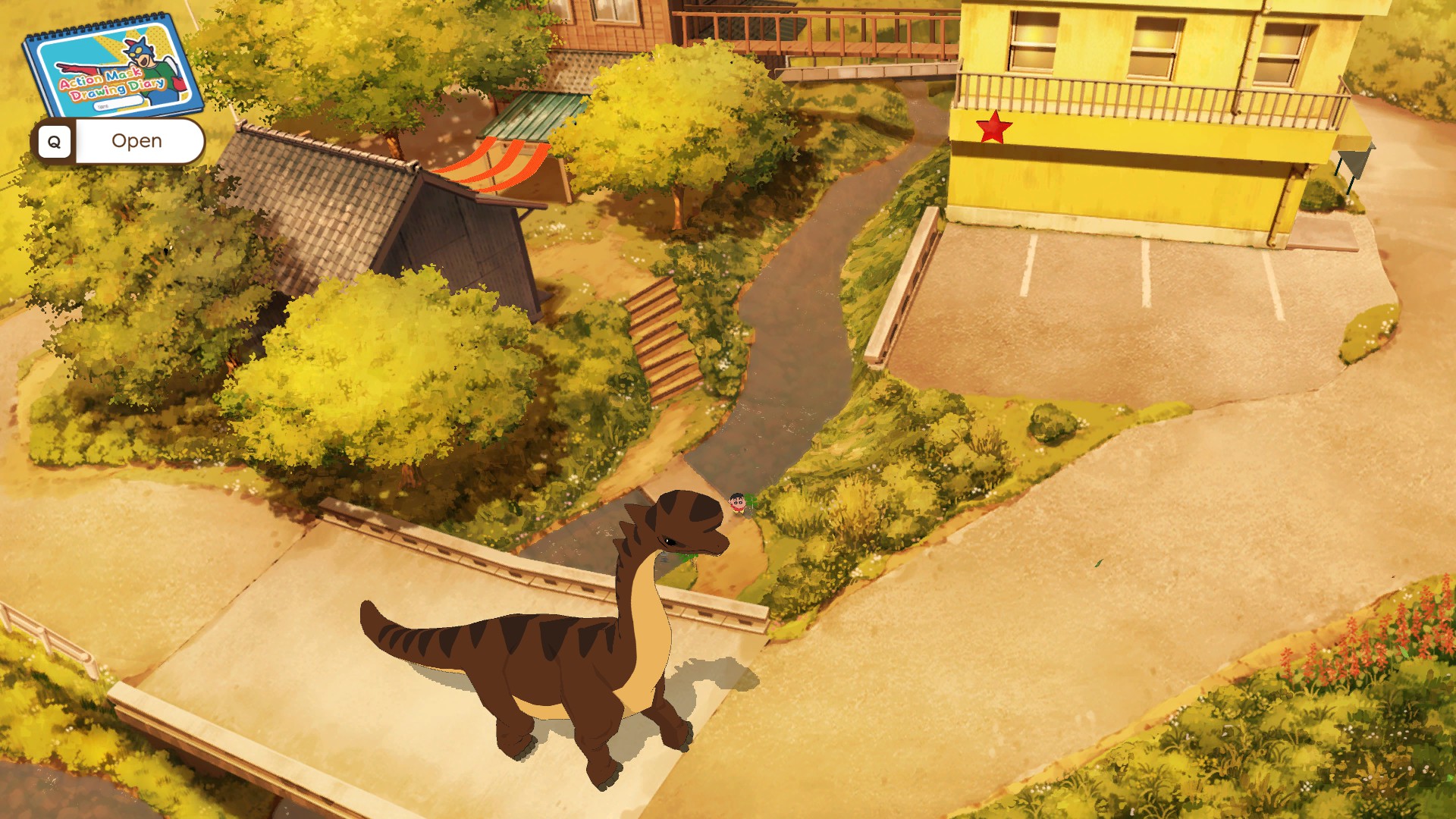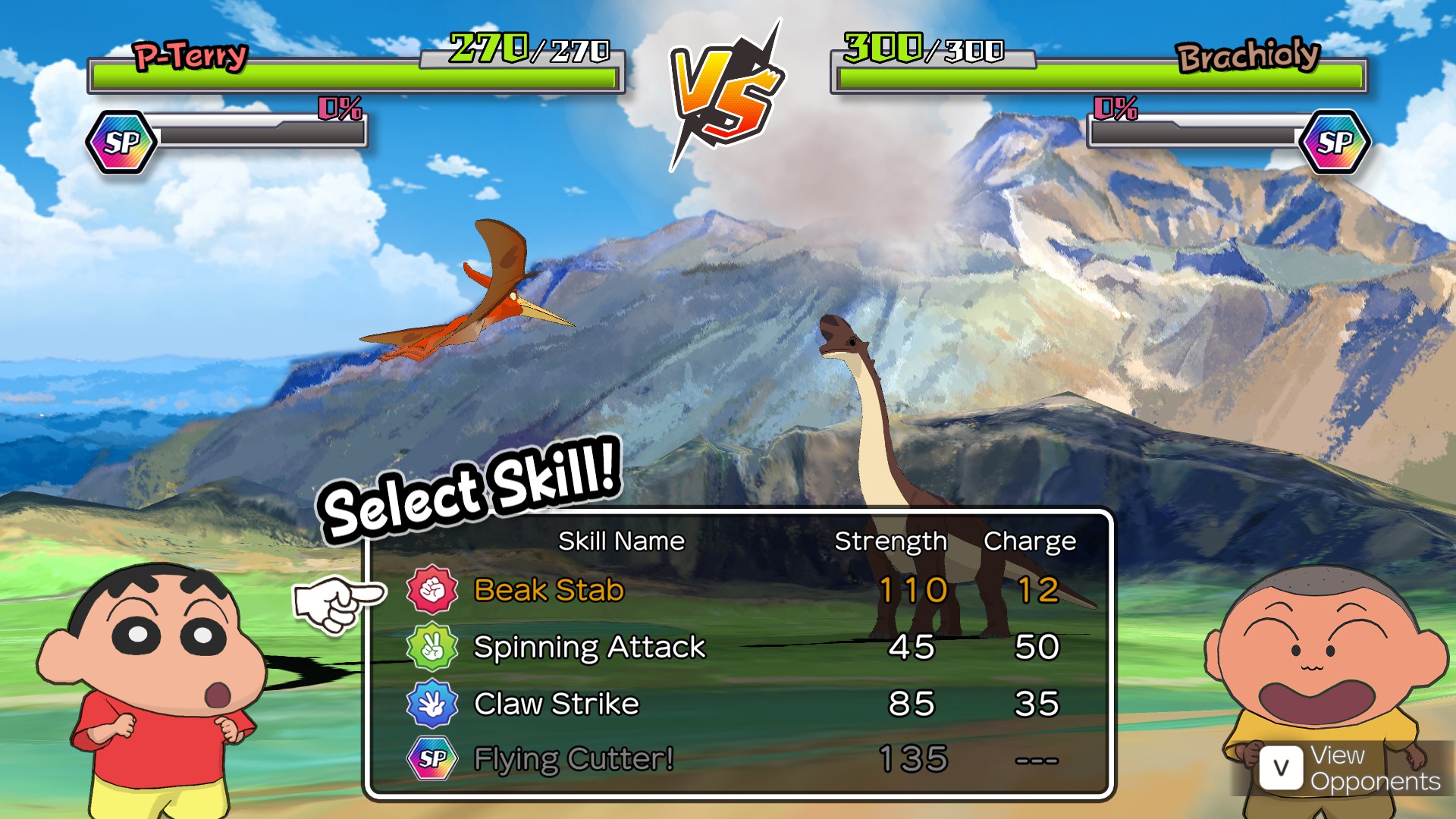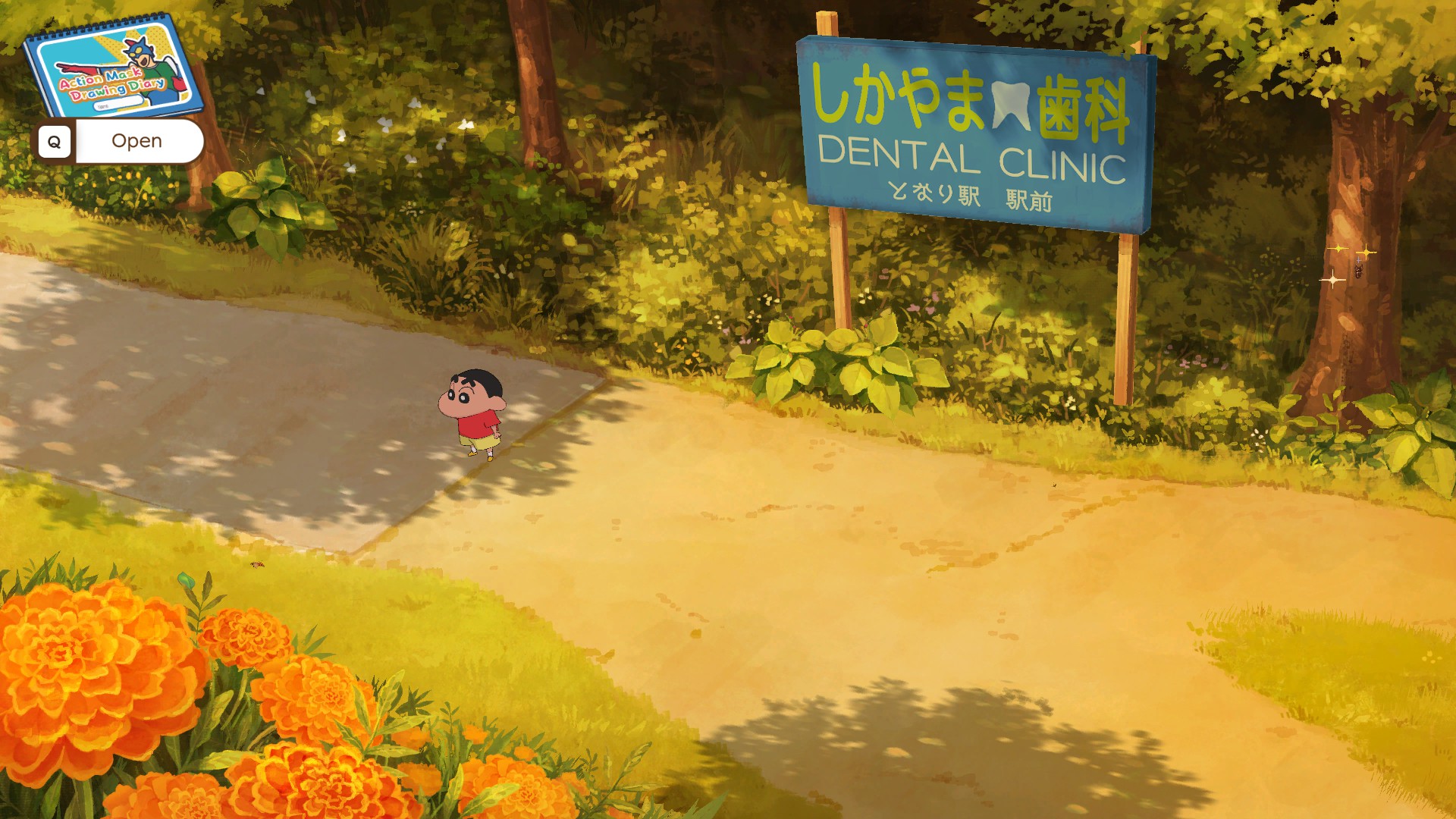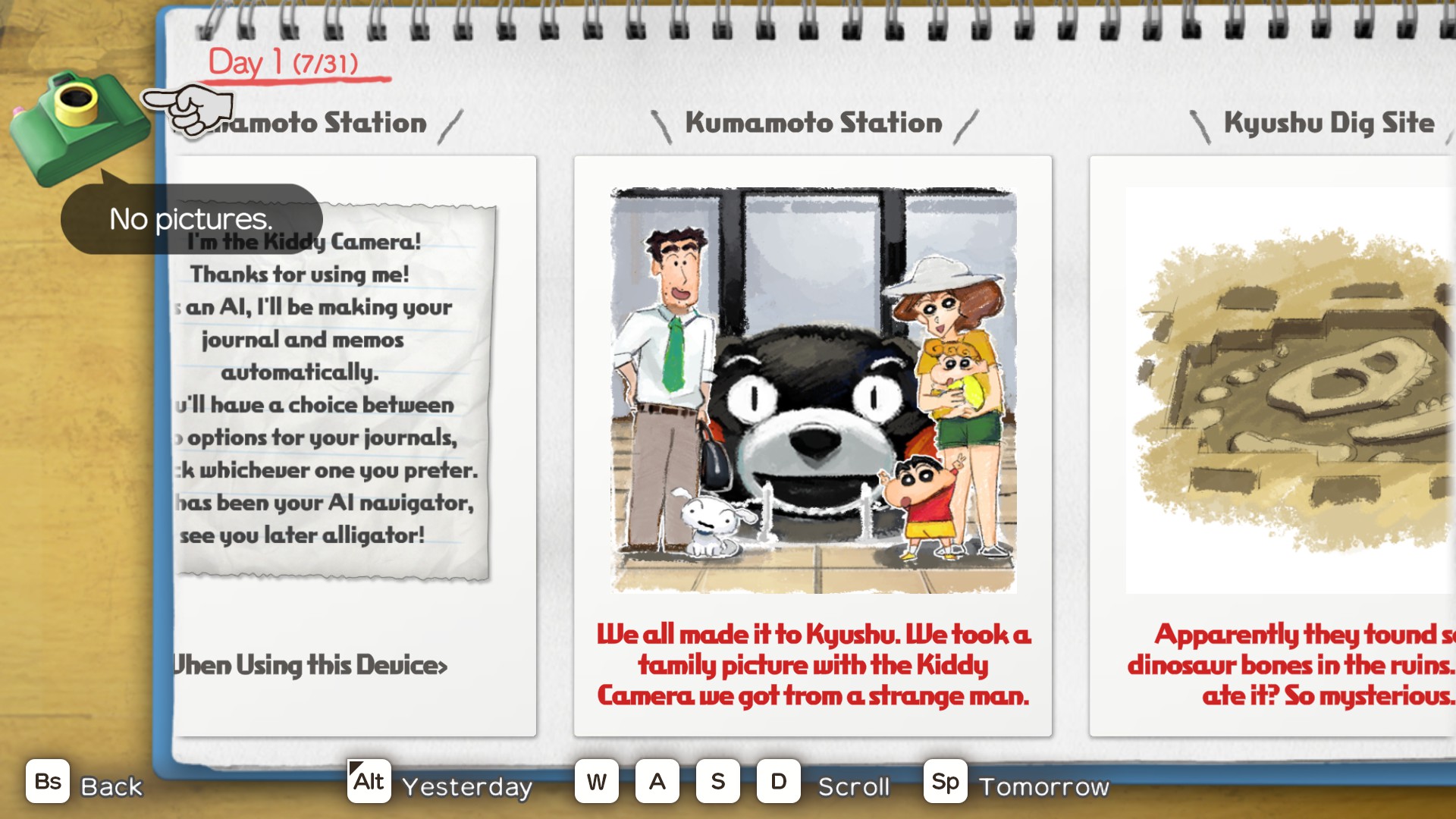What comes to mind when I initially saw 90’s Japanese manga icon Shinnosuke Nohara, plastered on a cozy life sim game was the infestation of movie-to-video game adaptations in the game market. From Finding Nemo on PS2, to Harry Potter on the DS, I was skeptical that Shin chan was being used as a marketing pull for long-time fans to buy a lackluster game. However, to my surprise, Shin chan: Me and the Professor on Summer Vacation – The Endless Seven-Day Journey – (and… breathe) is a hearty adaptation that just makes sense for the material it’s adapting. There is an obvious passion here to match the manga’s feel and style to its gameplay and world, but sadly, Shin chan and family don’t always hit the mark.
The Endless Seven-Day Journey tells the adventure of Shin chan and his family, who spend summer vacation with Misae’s childhood friend. On their way, they stumble into a not-so-subtle mysterious man who gifts Shinnosuke a camera that captures illustrations instead of photos. This key item becomes more relevant as the week progresses, leading to some weird shenanigans, including dinosaurs and time loops.
I went into this game relatively blind but as a long-time anime lover, I had conceptions on what Shin chan was, but that was about it. Instead, I was drawn to the promise of cozy and micromanagement. Therefore, this review is a first impression of what this game can offer, so no blind-eyed fan service talk here! Although it is important to establish some context to understand what vibe this game is providing, it is definitely a unique take on the cozy genre with its simplicity and, oftentimes, sheer monotony.
Shin chan, The Endless Seven-Day Journey is a collaboration between Crayon Shin chan and Boku no Natsuyasumi. The former is a popular children’s manga from the 90s that tells the adventures of 5-year-old Shinnosuke and his family and friends. These tales are often bizarre and quirky, comedically spectated through Shin chan’s unconventionally adult-like perspective. This comes through powerfully in his in-game character, often making inappropriate jokes and commenting on parenting and social issues; he’s definitely not your conventional 5-year-old. This pairs well with its distinct cast of characters, including his mom and dad, who are full of hilarious faults. However, the game doesn’t stumble with its original cast either; the villagers and Misae’s friend’s family are all quirky and loveable, albeit simplistic and inoffensive. I finished the game being pleasantly surprised by how quickly I melded with this cast and understood why Shin chan is so popular.
The other side of this game is its inspiration taken from Boku no Natsuyasumi, a series of games from the early 2000s that sadly never made its way to the west. Despite this, its fan base is dedicated and loud about how great and nostalgic these games are. At its core is its simplicity and nostalgia for a summer that’s long gone, found in its complete freedom and menial tasks, like fishing and farming. Shin chan: The Endless Seven Day Journey is seen as its spiritual successor, due to Boku no Natsuyasumi’s previous director coming back to write and direct it.
Despite the supposed conflict between Shin chan’s extremely cartoonish art style and the beauty and serenity of rural Japan, the wonky and disproportionate characters and the hand-drawn pre-rendered backgrounds blend quite seamlessly together. The characters stand out but they never take away from their surroundings, and each area is detailed and captures the quaint feeling of a small village, from the shopping district to its pastures. This is a standout quality of Shin chan, and for such a simple game, it can be enough for some players.
However, I do have a qualm with its practicality, mainly in how it can be difficult for the player to navigate them. More often than not, I couldn’t tell where I could and couldn’t go. This is an inherent problem found in pre-rendered backgrounds, as they can only provide visual feedback for the player to figure out. A few screens will also be quite vast in size, leaving Shin chan to be a dot in his surroundings. This isn’t necessarily an issue for Shin chan, but it is when the player is bug hunting, one of the game’s core gameplay features. The bugs hardly stand out in their environment, insisting the player squint at the screen to see a ladybug. I also found it difficult to actually catch the bugs, another common problem found with pre-rendered backgrounds as I often used their shadow to aim for. However, I still ended up frustratingly swinging my net about to catch every bug I came across.
Another issue was how disorientating the map felt, especially in the early game. A lack of map does play into the theme of a child being lost in a new environment, but I often found the frequent switches in camera angle in different zones quite disorientating, and it was a struggle to not end up running around in circles. However, this wasn’t a major problem in the grand scheme of things.
In terms of its gameplay, Shin chan doesn’t give the player much to do, and these tasks are less than substantial. The story may paint the game as an adventure, but it’s more like a lazy summer. The player can catch bugs, fish, harvest crops, and engage in dinosaur Pokémon-style battles; yes, one is a bit unlike the others. All these features are extremely simple; you aim and press A. I was a bit disappointed that minigames weren’t attached to these features, even if it was simple like fishing in Stardew Valley or scaring bugs away like in Animal Crossing.
Everything you find aids you in the game’s fetch quest systems; bulletin boards will be posted outside every shop, like Yoyoko’s restaurant and Mott’s general store, where you can cash in your findings to get pocket money to buy snacks. This is the bulk of the game, which can get boring, but I honestly found that when you have multiple boards to complete, you get a small pleasure from micromanaging what you need. I can’t emphasize enough how simple this gameplay loop is, but as you fill out your compendiums it does get rather addictive, but that wears off as you complete more quests and find yourself hanging about for certain bugs and items to spawn.
Speaking of snacks, there is a stamina system attached to young Shin chan, where if it runs out, you pass out and wake up at home. To put it lightly, this feature is completely useless as there is no real consequence for letting it completely deplete. To refill it, you consume snacks that you buy, but I never engaged with this system as I kept my money for ingredients instead. Waking up far away from your location can be a minor inconvenience, but that’s all it is, as you can quickly speed back to where you were. Overall, Shin chan’s gameplay feels lackluster as it feels like there is something missing. For a game that’s essentially a collectathon, it needed an extra layer of depth to make me care about my actions.
My biggest gripe with this game is found in its UI as these little things end up accumulating to the point of frustration. This ranges from nitpicks like large dialogue boxes being awkwardly placed, to dialogue that repeats itself far too often. When interacting with Yoyoko’s restaurant bulletin board, she and Shinnosuke have the same interaction every single time, and this isn’t just a one-liner which bogs down returning to her quests. Furthermore, when you complete your first week and you find out what you’ve gotten yourself into, the game feels the need to repeat itself, recounting past events that I played half an hour ago.
On a more positive note, the game incorporates the illustration camera stylishly through a scrapbook that updates as you encounter a new event. These little pictures were always a delight to see, and the player can pick between a basic tagline or a more detailed one. I don’t really understand this choice, as of course I’m always going to go for the one that’s quippy and detailed, not a simple summary. Also, a shout out to the butt-alien mode used for sprinting; it caught me completely off guard, and I can’t help but laugh every time I have it on.

